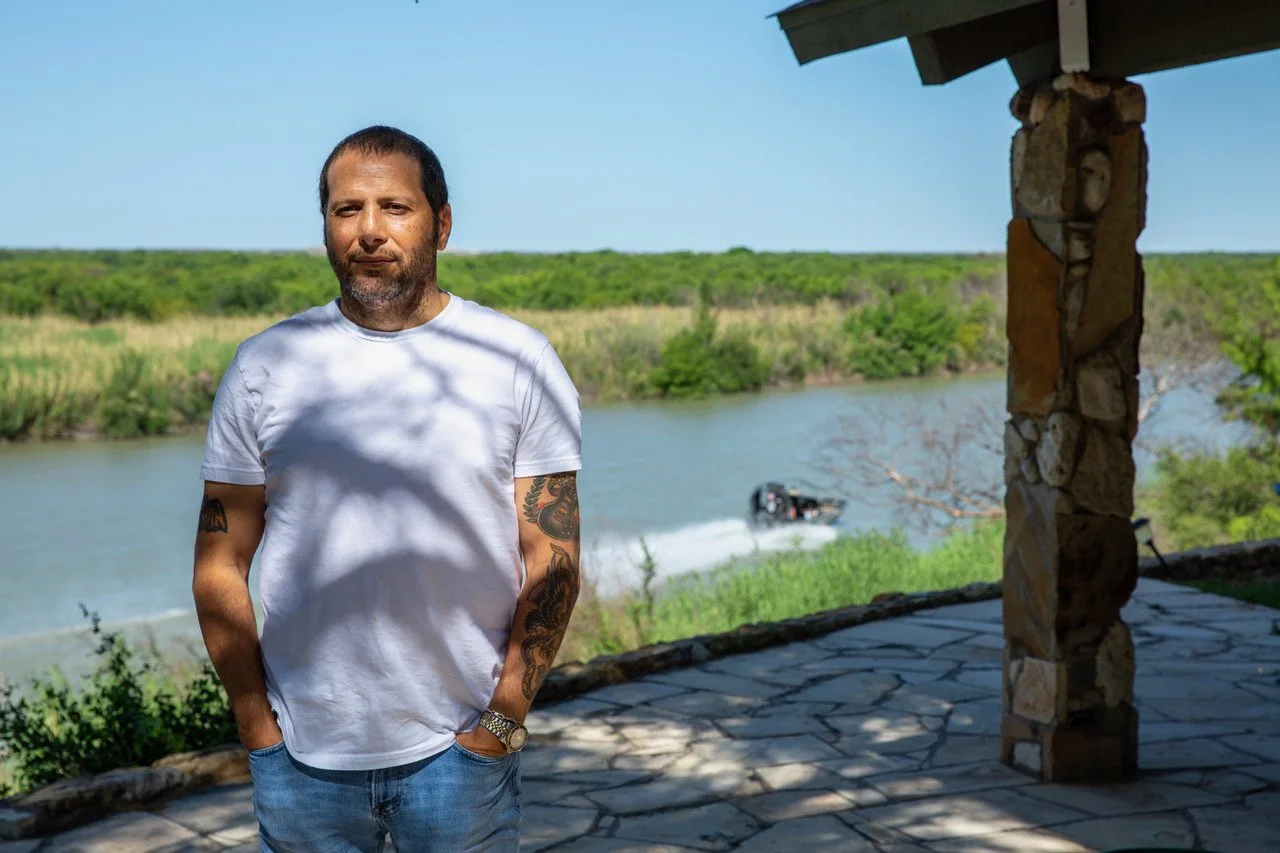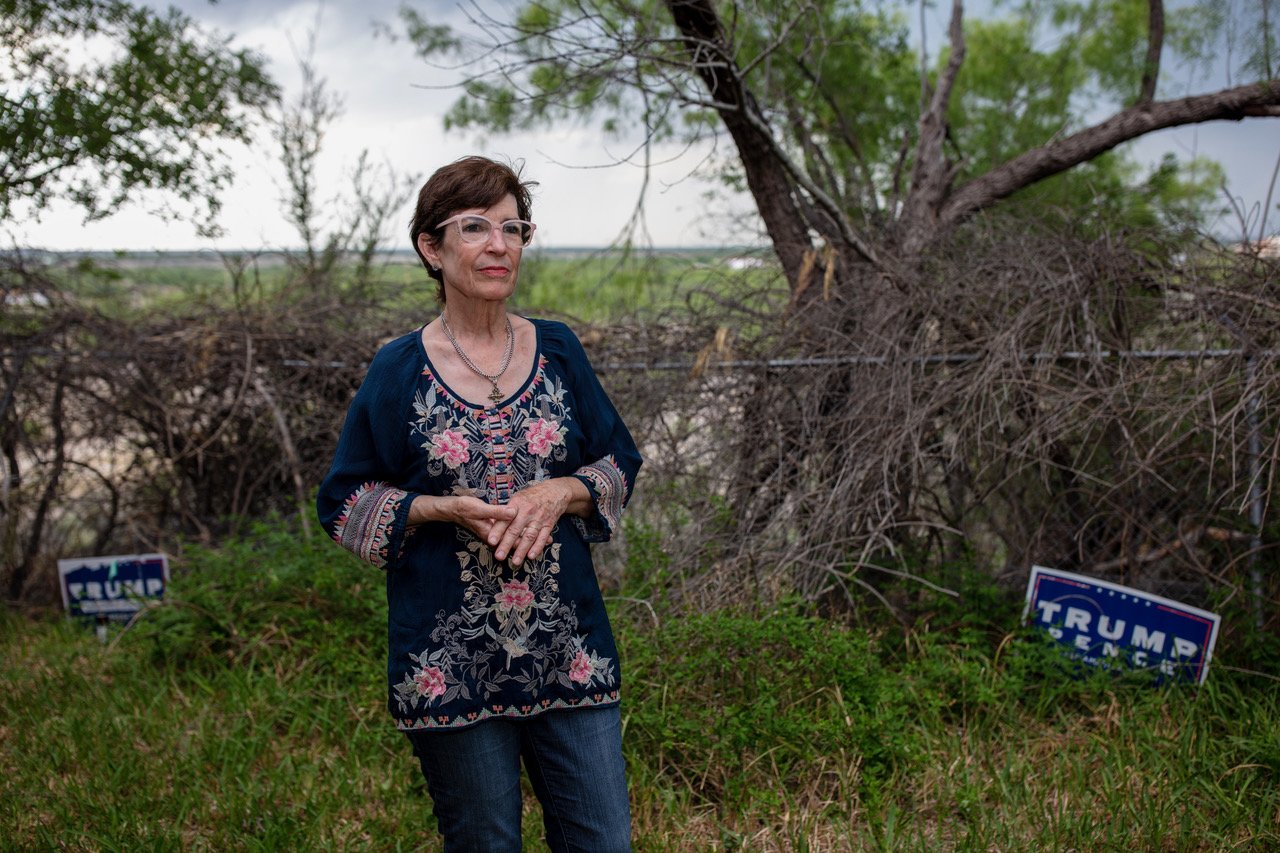Lines from the Border
May 31 • Written by Julie Winokur / Photos by Ed Kashi
This is our antidote to the hysteria driving most media coverage and warping our sense of who we actually are as a nation.
Ed and I recently returned from Eagle Pass, Texas, a border town on the Rio Grande where the steady flow of migrants outnumbers the local population. This area gets from 100 to 1000 illegal crossings per day, depending on whose numbers you trust and which border policy is currently in place. Our visit coincided with the final weeks of Title 42—the COVID-era regulation designed to keep migrants in limbo across the border ‘for health reasons’. The media predicted an apocalyptic flood—a surge—when the law expired. We have since seen that the five alarm hype didn’t match reality, and once again we are left confused and distracted by misrepresentation.
We went to Eagle Pass not because of the migrant crisis, but despite it. We are continuing work on American Sketches, our observational journey across a country that defies classification despite our need to classify everyone in it. Our goal is to document people of a place at this time, allowing them to dictate their own true narratives against the backdrop of churning current events. This is our antidote to the hysteria driving most media coverage and warping our sense of who we actually are as a nation.
Poncho Nevarez cheers his daughter on at the Lady Eagles softball playoff game.
A Border Patrol boat speeds past Poncho’s home, with Mexico visible across the river.
From a distance, Eagle Pass sounds like a place where drama jumps out of the cracks in the pavement, high speed chases rule the roads, and trafficking of one sort or another is just commerce as usual.
On the contrary, we found a relatively quiet, deeply rooted town that feels more like northern Mexico than the southern United States. Spanish is prevalent, and the only non-Latinos seem to work for Border Patrol or the National Guard.
“This is kinda like occupied territory,” says Poncho Nevarez, a former Texas State Representative with a buzz cut and tattooed biceps. One of the few Democrats in the Texas legislature, he chaired the Homeland Security and Public Safety Committee. Historically, the southern U.S. border laid as far north as Wyoming, just one more example of how borders transform even when people don’t. Growing up, his father always referred to White people as “Americanos,” people distinct from Poncho and his family despite their deep roots on both sides of the border. Poncho, who was raised Catholic, traces his ancestry to Sephardic Jews who fled Spain in the 15th century and made their way to this region by 1700. By all accounts, Poncho’s family is more American than my own, which arrived two centuries later. Yet he is the one who still has a hyphenated identity: Mexican-American.
I was struck by the fluid relationship people in Eagle Pass have with the border, which is more a passageway than a barrier. “The river doesn’t know it’s a border,” says Poncho as we walk the grounds of his sprawling 30-acre ranch, located right on the banks of the Rio Grande. A few days before we visited, Poncho saw three migrants climbing up the steep banks of his property in search of a road. His first instinct was to fire a pistol in the air to scare them off. Instead he yelled down the slope, telling them that they should continue farther along the riverbank because his property is fenced and gated, as much to keep the animals in as the people out. Most of the migrants he sees are tired, hungry and desperate. He advised his uninvited visitors to make the passage after sunset, unless they planned to turn themselves in and ask for asylum, which they didn’t.
Cornelia Muzquiz poses for a portrait on her property.
Cornelia prepares for Sunday services at Church of the Redeemer.
Farther downriver, Cornelia Muzquiz shows us a dirt road used by border patrol that is visible from her terrace. Also visible are her Trump lawn signs. A widow who lives alone, she keeps a pair of men’s sneakers outside the front door to deter unwanted visitors. During the pandemic a Honduran woman knocked on Cornelia’s living room window, startling her. She gave the woman some water and told her to “keep the sun on her left and Mexico on her right,” so she could find her way to the train.
Cornelia, a White woman and devout Episcopalian, raised her three children in Mexico on the family ranch, 45 minutes from the nearest town. Her hazel eyes, pink-rimmed glasses, embroidered blouse and gentle demeanor are camouflage for a tough frontier woman. She carries a 9mm pistol in her purse that she says she’s prepared to use, and she recounts in a soft-spoken voice being held hostage in Mexico for two hours at gunpoint in 2014 by members of a drug cartel. The fact that she lived to tell the tale seems statistically impossible. It is one of many anomalies we encountered in Eagle Pass, where a former gay porn star sits on the City Council and Poncho, who was caught on camera with cocaine while he served in the Texas legislature, still polls well if he chooses to run for office again.
Cornelia takes us to meet Sandra Sassano, a candidate for city council who happens to be Poncho’s cousin. As Chair of the Republican Party of Maverick County, Sandra’s chances are slim to none. This is blue country, and Sandra insists that the democrats are “vote haulers” as evidenced at the national level by “the steal.” Undeterred, she keeps a clipboard at the ready to mark each voter who walks into the Multi-Purpose Center to cast a ballot.
Sandra Sassano meditates over her Bible before campaigning.
It dawns on me how little we truly understand about what happens at the border: who gets apprehended, who is sent to detention and who is sent ‘back where they came from.’
Sandra starts her day by flipping open her bible to a random page and meditating on whatever passage reveals itself. Today is Isaiah 41:
“Be silent before me, you islands! Let the nations renew their strength!
Sandra works as a translator for a large multinational corporation, which she is not at liberty to name (I have no idea why) and says she has helped “illegals” register for Mass Health, the Massachusetts Medicaid program. She claims that migrants are offered citizenship outright, no strings attached, in the state of Massachusetts. In disbelief, I ask why, to which she responds, “Because they’re future voters.”
Sandra points out a couple of young men in dirty jeans with backpacks slung over their shoulders. In the context of Eagle Pass, these men might as well be wearing sandwich boards that advertise “Migrants.” She gestures to them and says, “The good ones are out in the open,” but “the got-aways, they’re the bad ones, the criminals.” Sandra believes migrants are given money and plane tickets, at taxpayer expense, a regular red carpet to make themselves at home.
“The poor and needy search for water,
but there is none;
their tongues are parched with thirst.
But I the Lord will answer them;
I, the God of Israel, will not forsake them.”
It dawns on me how little we truly understand about what happens at the border: who gets apprehended, who is sent to detention and who is sent ‘back where they came from.’ During our stay I heard multiple accounts of how Border Patrol processes migrants, many of whom are given court dates far in the future, which ends up being an invitation to disappear. What happens beyond that is the stuff of speculation and urban myth.
More to come…






